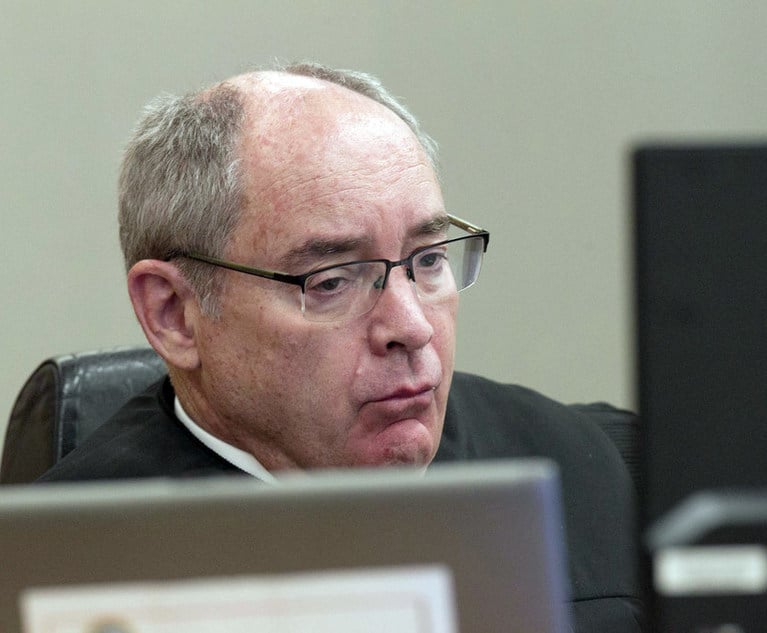 Dupont headquarters at Chestnut Run Plaza. Photo: Littleinfo/Wikimedia Commons
Dupont headquarters at Chestnut Run Plaza. Photo: Littleinfo/Wikimedia CommonsGlasscock Blocks Appeal in DuPont's Bid to Keep Under Seal Lawsuit Over Corporate Spinoff
The ruling, issued late last week by Vice Chancellor Sam Glasscock III, could clear the way for Chemours' 65-page complaint against DuPont to be made public.
June 11, 2019 at 04:27 PM
3 minute read
A Delaware Chancery Court judge has denied DuPont's request to appeal an earlier decision that ordered the unsealing of a lawsuit filed by chemical manufacturer The Chemours Co. over its spinoff from the Delaware chemical giant in 2015.
The ruling, issued late last week by Vice Chancellor Sam Glasscock III, could clear the way for Chemours' 65-page complaint against DuPont to be made public. Until now, the filing has remained almost completely redacted, though supplemental filings indicate that the suit seeks “substantial relief relating to a spin-off transaction.”
DuPont's attorneys have argued that the dispute was subject to a provision of the separation agreement that mandated confidential arbitration and warranted keeping the complaint under wraps pending a motion to dismiss.
Glasscock rejected that argument during a bench ruling May 23, but delayed compliance to allow DuPont to apply for interlocutory appeal, which would have sent the issue directly to the state's five Supreme Court justices.
According to court documents, DuPont argued in its application that prior Chancery Court decisions differed on whether an agreement requiring confidential arbitration “constitutes good cause for confidential treatment of a complaint pending resolution of a motion to dismiss for lack of subject matter jurisdiction.”
On Friday, Glasscock said that DuPont had “erroneously” framed the question they wanted to appeal. Instead, he denied DuPont's application under a Chancery Court rule, which presumes that all cases are to be litigated in public, unless the parties involved can show the public interest is outweighed by a “discrete confidential interest.”
“Specifically, the defendants seek review of a finding that the parties, having failed to comply with the rule, must litigate in public, consistent with the '[g]eneral principal of public access' provided in Rule 5.1(a),” Glasscock wrote in a 9-page letter opinion. “I do not find on balance that the interests of justice weigh in favor of interlocutory appeal.”
Counsel for Chemours declined to comment, and an attorney for DuPont was not immediately available to comment.
DuPont spun off its chemical performance unit in 2015, as it pursued a merger with Midland, Michigan-based Dow Chemical Co. The companies officially announced the tie-up that December, in what firm leaders touted as an “all-stock merger of equals,” which split the combined firm into three publicly traded companies for agriculture, material science and specialty products.
The new company, named DowDuPont Inc., maintains dual headquarters in Wilmington and Midland.
Chemours filed its eight-count complaint against DuPont in May 13. The lawsuit also names as defendants DowDuPont and Corteva, DowDuPont's former agricultural division, which was spun off earlier this year into an independent, publicly traded company.
Chemours is represented by Joel Friedlander, Jeffrey Gorris, Cristopher Foulds and Cristopher P. Quinn of Friedlander & Gorris.
The defendants are represented by Robert S. Saunders, Jennifer C. Voss, Arthur R. Bookout and Jessica R. Kunz of Skadden, Arps, Slate, Meagher & Flom.
The case is captioned Chemours v. DowDuPont.
This content has been archived. It is available through our partners, LexisNexis® and Bloomberg Law.
To view this content, please continue to their sites.
Not a Lexis Subscriber?
Subscribe Now
Not a Bloomberg Law Subscriber?
Subscribe Now
NOT FOR REPRINT
© 2024 ALM Global, LLC, All Rights Reserved. Request academic re-use from www.copyright.com. All other uses, submit a request to [email protected]. For more information visit Asset & Logo Licensing.
You Might Like
View All
Another Roundup Trial Kicks Off in Missouri. Monsanto Faces 3 Plaintiffs
4 minute read
Why the Wide Range of Roundup Verdicts? It Might Depend on What Juries Hear About the EPA
8 minute read
'What is it Worth?': Delaware Jury Hears State's First Roundup Trial
4 minute read
Reed Smith to Defend Commercial Seed Producer Over Patent for Breeding Maize
Trending Stories
- 1Judge Denies Sean Combs Third Bail Bid, Citing Community Safety
- 2Republican FTC Commissioner: 'The Time for Rulemaking by the Biden-Harris FTC Is Over'
- 3NY Appellate Panel Cites Student's Disciplinary History While Sending Negligence Claim Against School District to Trial
- 4A Meta DIG and Its Nvidia Implications
- 5Deception or Coercion? California Supreme Court Grants Review in Jailhouse Confession Case
Who Got The Work
Michael G. Bongiorno, Andrew Scott Dulberg and Elizabeth E. Driscoll from Wilmer Cutler Pickering Hale and Dorr have stepped in to represent Symbotic Inc., an A.I.-enabled technology platform that focuses on increasing supply chain efficiency, and other defendants in a pending shareholder derivative lawsuit. The case, filed Oct. 2 in Massachusetts District Court by the Brown Law Firm on behalf of Stephen Austen, accuses certain officers and directors of misleading investors in regard to Symbotic's potential for margin growth by failing to disclose that the company was not equipped to timely deploy its systems or manage expenses through project delays. The case, assigned to U.S. District Judge Nathaniel M. Gorton, is 1:24-cv-12522, Austen v. Cohen et al.
Who Got The Work
Edmund Polubinski and Marie Killmond of Davis Polk & Wardwell have entered appearances for data platform software development company MongoDB and other defendants in a pending shareholder derivative lawsuit. The action, filed Oct. 7 in New York Southern District Court by the Brown Law Firm, accuses the company's directors and/or officers of falsely expressing confidence in the company’s restructuring of its sales incentive plan and downplaying the severity of decreases in its upfront commitments. The case is 1:24-cv-07594, Roy v. Ittycheria et al.
Who Got The Work
Amy O. Bruchs and Kurt F. Ellison of Michael Best & Friedrich have entered appearances for Epic Systems Corp. in a pending employment discrimination lawsuit. The suit was filed Sept. 7 in Wisconsin Western District Court by Levine Eisberner LLC and Siri & Glimstad on behalf of a project manager who claims that he was wrongfully terminated after applying for a religious exemption to the defendant's COVID-19 vaccine mandate. The case, assigned to U.S. Magistrate Judge Anita Marie Boor, is 3:24-cv-00630, Secker, Nathan v. Epic Systems Corporation.
Who Got The Work
David X. Sullivan, Thomas J. Finn and Gregory A. Hall from McCarter & English have entered appearances for Sunrun Installation Services in a pending civil rights lawsuit. The complaint was filed Sept. 4 in Connecticut District Court by attorney Robert M. Berke on behalf of former employee George Edward Steins, who was arrested and charged with employing an unregistered home improvement salesperson. The complaint alleges that had Sunrun informed the Connecticut Department of Consumer Protection that the plaintiff's employment had ended in 2017 and that he no longer held Sunrun's home improvement contractor license, he would not have been hit with charges, which were dismissed in May 2024. The case, assigned to U.S. District Judge Jeffrey A. Meyer, is 3:24-cv-01423, Steins v. Sunrun, Inc. et al.
Who Got The Work
Greenberg Traurig shareholder Joshua L. Raskin has entered an appearance for boohoo.com UK Ltd. in a pending patent infringement lawsuit. The suit, filed Sept. 3 in Texas Eastern District Court by Rozier Hardt McDonough on behalf of Alto Dynamics, asserts five patents related to an online shopping platform. The case, assigned to U.S. District Judge Rodney Gilstrap, is 2:24-cv-00719, Alto Dynamics, LLC v. boohoo.com UK Limited.
Featured Firms
Law Offices of Gary Martin Hays & Associates, P.C.
(470) 294-1674
Law Offices of Mark E. Salomone
(857) 444-6468
Smith & Hassler
(713) 739-1250






